Fiske Fakta - Deadly Trolling Techniques Using Hot Spot
Designed and produced by successful fishermen, Hot Spot’s deadly trolling techniques have been proven to catch more fish, bigger fish, and a greater variety of fish. Initially developed for commercial Salmon fishing, these techniques are equally effective with numerous other game fish species including: Albacore, Bass, Mackinaw, Trout, Halibut, Walleye and Pike.
Rigging techniques and tricks provide the vital difference between catching no fish and achieving your limit regularly. Why is it that a few fishermen always seem to catch more fish? Luck? Successful fishing has very little to do with luck. What gives you the edge is knowledge...simply knowing the tricks of successful angling.
Rigging the Flasher to the Downrigger Weight Some fishermen prefer to avoid the drag of a flasher once they catch a salmon. One method of doing this is to tie the flasher on a separate leader attached to the downrigger cannonball. Baits or lures can then be stacked higher up on the downrigger wire. I like to leave about ten feet between my flasher and a stacked bait to ensure that they do not tangle as the flasher spins.
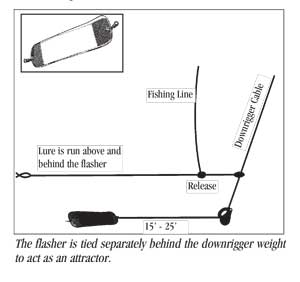
Why the Hot Spot Really
Works
Over 100 years ago fishermen discovered that their catch could be improved significantly by using a flashing or dodging attractor trolled ahead of their fishing lure. Game fish were attracted to the system and would then respond to bait or lure trailed behind the flasher. Most early flashers were made of formed metal.
The Hot Spot Flasher was developed in the 1950s with the advent of highly stable plastics. It immediately offered advantages never before achievable with other flasher designs. The key advantage was the shape of the flasher, which provided the optimum rolling and kicking action in the water. With new moulding technologies and new plastics, this exact shape can be maintained and duplicated over and over again.
Today, every commercial troller in the world knows the Hot Spot Flasher. Skilled and successful fishermen also consistently use the deadly Hot Spot system. Its carefully engineered shape and rigid quality control ensure that fishermen can achieve consistent, quality results. A great deal of research has been done on why predatory fish are attracted to a flasher or dodger. The research work proves that the powerful vibrations emitted by the erratic movement of the flasher attract fish from up to 40 or 50 yards away. In most cases the fish never see the flasher until they are within a few feet of it. Research concludes that the darting flasher action exactly duplicates the vibrations made by predators as they attack bait fish, and that feeding fish are attracted to this motion in the water. The result is a congregation of hungry fish at the flasher, which are led to believe that other fish are feeding.
Standard Hot Spot Rigging
The Hot Spot Flasher will perform well in a variety of setups. The key decisions a fisherman needs to make are:
1) The leader length between the downrigger release and the flasher.
2) The tail length between the flasher and the hoochie or bait behind the flasher.
3) The weight of the leader to use.
4) Which bait, lure or hoochie to use behind the flasher.
A typical Chinook Salmon setup is 18 ft. of 30 lb. leader between the 11” original Hot Spot and the downrigger release, and 42” of 30 lb. tail leader to the hoochie.
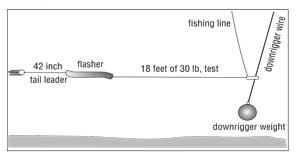
The diagram shows the most common setup for Chinook Salmon. The distance between the downrigger release and the flasher is 18 ft. (three fathoms), and the tail distance is 42” — this is the same setup measurements most often used by commercial Salmon trollers.
A hoochie trolled behind the flasher is the most popular system. A leader weight of 30 lbs. is an optimal weight for a sports fishing setup. When fishing at shallow depths (less than 40 ft.) for Trout and Salmon (large Chinooks), a longer leader (30-70 ft.) from release to flasher is recommended.
The ideal leader or “tail” length behind the flasher varies by the type of fish desired and by the lure used behind the flasher. When trolling slowly and fishing for smaller Salmon, use the shorter dimensions. When trolling quickly and for larger Salmon, use the longer lengths.
The usual setup is 60” to 72” tail leaders and trolling speeds of 2.3 to 3.0 M.P.H. Rolling the bait at 60 rpm will almost always bring results. This table provides an overall guide:
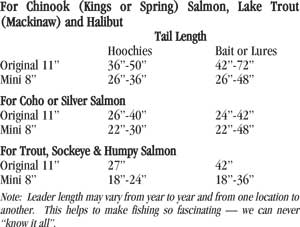
Alternate Rigging Tricks
The Hot Spot lets you vary leader and tail lengths to achieve a variety of results. Recently, many fishermen have used front leader lengths as short as three feet with excellent results. Often, two flashers can be fished together at slightly different depths to enhance their attractiveness. The diagram shows one setup in which a bottom flasher is run up the downrigger wire with a longer leader. If you are fishing close to the bottom with two flashers, it is very productive to use a Mini flasher on the bottom, tied about four feet back with an Original 11” flasher six to eight feet up the downrigger line. Use 20 to 30 feet of leader in front of the flasher.
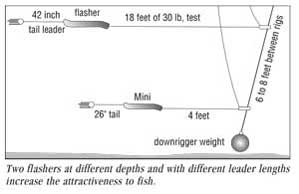
Colour and Size Selection
Hot Spot offers a variety of colours and finishes. The basic colours are red, green, blue, white, chartreuse and purple — red and green are the most popular. Finishes include reflective silver mylar, transparent pearl and glow-in-thedark.
Water and fish conditions help to determine the optimal colour flasher and colour hoochie or lure. Water colour is very important; it can vary from the extremes of absolutely clear to absolutely brown, with a myriad of green and blue shades in between. Water colour variations are caused by algae and plankton growth and silt — they can change within a few miles, especially in salt water. Water colour can best be observed by looking at the prop wash, particularly when air bubbles are present. The following is a general guide:
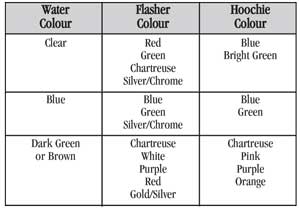
In recent years, multi-coloured hoochies are providing good results in a wide range of water colours. One of the Hot Spot Flasher’s major advantages is that it can be trolled at a wide range of speeds and will perform equally well in all circumstances. Its productive rolling and kicking action is consistent anywhere between 1.5 and 3.5 knots. The most common speed for Chinooks (Springs) is 2.3 to 2.75 M.P.H. and for Coho is 2.5 to 3.0 M.P.H.
Apex Trolling Lure
The vibrating and spinning action of the Apex Trolling Lure makes it one of the most popular trolling lures on the market. With seven sizes and 40 colours available, it is highly effective with Salmon, Trout, Mackinaw, Lakers, Walleye, Pike and other game fish that feed on minnows or bait fish.
Apex Tricks
Most game fish feed on minnows or small bait fish, as they are attracted by the active darting movements of the bait fish. The dodging and weaving action creates strong vibrations in the water. Game fish can sense these vibrations and are immediately attracted to the area. According to the latest research, erratic vibrations like those made by a wounded bait fish are the most enticing.
The Apex Lure duplicates the movements of a wounded bait fish. Its contoured-scoop front surface causes a rapid, sideto- side shaking action as it is trolled. The Apex will also dart violently from side to side and will spin from time to time. These actions are highly attractive to fish and no other artificial lure has duplicated Apex’s movements.
Kokanee Special
One of the difficulties in catching Kokanee is holding this soft mouthed landlocked Sockeye Salmon after the initial take. To better hold Kokanee Hot Spot has developed, with the aid of avid Kokanee angler Phil Johnson, the Kokanee Special which boasts a unique tandem hook setup. Check local regulations for hook restrictions.
The Kokanee Special employs two red chemically sharpened ultra sharp hooks tied in tandem about 1/4” to 1/2” apart. This hook arrangement is particularly effective when coupled with the unique Apex rigging that allows the Apex blade to slide up its leader. Kokanee can’t use leverage to dislodge the hooks as with traditional rigged spoons.
The glow bead just ahead of the top hook serves as an added attractor in low light conditions or deeper water. Many Kokanee anglers will dress their hooks using any of a variety of bait, the most popular being maggots, white kernel corn, or worms. Again check your local regulations for bait restrictions. A word of caution when using bait is that you don’t use so much that it impedes the lure action.
For most light conditions or depths 308 Hot Pink, 309 Flame Orange or 310 Kokanee Red are top producers. These finishes have high fluorescence on their backs for bright light conditions, while the bellies are glow in the dark for low light or fishing at depths. The 302 Flame Sparkle is best in depths to 15’ on bright days, as both sides are high fluorescence with added chrome sparkle. On overcast days with low light the 75 Chartreuse and the 195 Chrome fishscale can be deadly to depths of 60’. Colour selection can change day to day and from one body of water to another so experiment until you hit the right colour.
The Kokanee special can be fished with or without an attractor. The action of the lure produces enough vibration to attract Kokanee from a wide distance. If you choose to use the Kokanee Special behind an attractor do not shorten the factory leader length 36” on a 1”, 48” on a 1.5”. Shortening the leader can impede the action of the lure.
Colour Selection
Different species of fish prefer different lure colours. Coho Salmon and Rainbow Trout prefer bright reds, oranges and silver colours. Other fish are attracted to more subdued colours. With Chinook Salmon, it is desirable to match the lure colour to the colour of the water. In clear blue water use a blue lure; in green water use a green lure. The following table is a guide only. It has been proven many times that certain colours in certain conditions can be deadly — and break all our rules. Local colour preferences should never be ignored. While no one has all the answers, we’ve offered a range of proven colour combinations. The following table lists the most popular colours and guidelines.
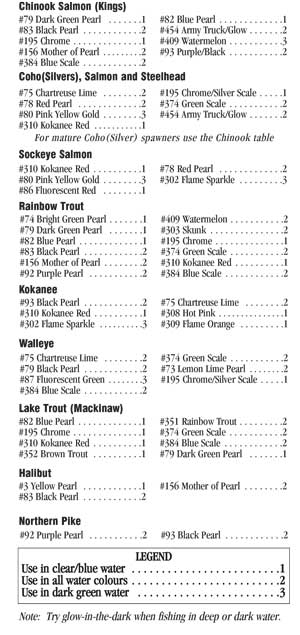
Size Selection
The selection of the correct Apex size is based on the size of the bait fish attacked by your target fish. The Apex size numbers correspond to bait fish inches. For example, trout feeding on small minnows would go after a 1.5”(A2) or a 3.0”(A3) size Apex. Salmon feeding on medium anchovies or small herring would go after a 4.5”(A5) Apex. Lake Trout (Mackinaw) feeding on Kokanee Trout would go after a 6.25”(A7) Apex.
Trolling Speed
The Apex maintains its vibrating action at a wide range of speeds; it has a strong shaking and rolling action even at speeds as slow as 1.5 knots. At the other extreme, the Apex can be very successful at speeds as high as four or five knots. Different models are designed to work best within certain speed ranges.
Apex Size Recommended Average Speed (Knots) Speed
- 1.0" 1.5 to 3.0 2.5
- 1.5" 1.5 to 3.0 2.5
- 3.0" 2.0 to 3.0 2.5
- 4.0" 1.5 to 2.5 2.0
- 4.5" 2.5 to 3.5 2.75
- 5.5" 2.0 to 3.0 2.5
- 6.25" 2.5 to 3.5 2.5
- The 4.0 and 5.5 sizes are wider; therefore, they allow slower trolling speeds for equal lure action.
Checking the Lure Action
Whenever you put an Apex in the water, check for two important things: the knot tied to the swivel must be straight, and the swivel and the hook must hang straight back. If the hook hangs to the side, the lure will not be balanced and will not have the right action. First, try the lure beside the boat. The action is fast so watch closely. There should be a clockwise then a counterclockwise motion. Varying the boat speed slightly will help get the ideal action. If the action is too radical, try a larger hook size and swivel When you are seeking Cutthroat or other Trout, slow trolling speeds are often the best way to attract bites. Lighter leaders will work best in this circumstance. A 6 lb. to 10 lb. test is recommended. An exception is fishing for Kamloops Rainbow or Steelhead, when a faster speed of 2.5 to 3.5 M.P.H. usually works best.
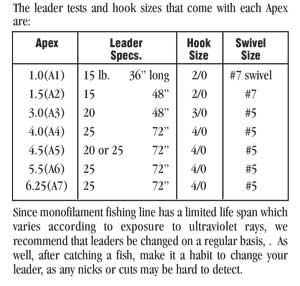
Tips on Apex Use
Tip #1: A little-known fact is that the Apex can be used in motor mooching. The trick is to use light leader and hook size as small as possible. Successful fishermen use 10-12 lb. test with a 3/0 hook and a #5 swivel on the four largest-sized Apex. Again, set your speed by observing the action of the Apex beside the boat. Using this method, the Apex will sometimes out-fish bait.
Tip #2: At times dressing your Apex with bait can be the extra stimulus that makes fish strike. For years New York fishermen have dressed their Apex lures with a worm threaded on the hook. When trolled behind a planer on Lake Erie this “rig” has come to be called a “Dunkirk Special”, after the New York city where this method was first used. Be sure to check the action of your Apex in the water to ensure you haven’t overwhelmed the lure action by using too large a worm or bait. If you find the action impaired, decrease the bait size until normal Apex action is restored. The addition of bait can slow the action down similar to using a larger hook. See previous section on checking lure action.
Tip #3: Rinsing your Apex, flashers, rods and reels in fresh water will extend their life.
